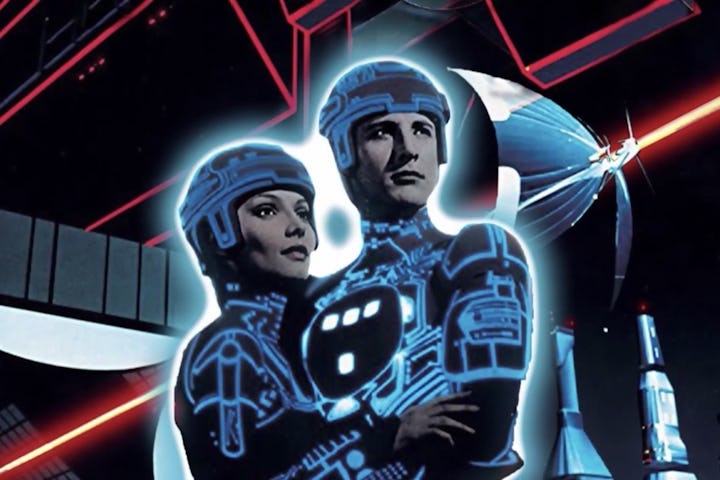41 Years Ago, Disney's Weirdest Failure Changed Sci-Fi Movies Forever
In 1982, Tron changed everything. But, at the time, almost nobody noticed.

When Jeff Bridges rocked the cover of Rolling Stone on August 19, 1982, his most well-known movies were probably The Last Picture Show (1971) and, Thunderbolt and Lightfoot (1974), both of which got him Oscar nominations. But on that vintage magazine cover, Bridges is decked-out in a funky costume adorned with circuit-board flourishes. This is his Tron outfit, in which he starred as Kevin Flynn, a programmer who gets sucked into the matrix — sorry — make that the Grid, and has to figure out what it’s like to navigate a video game world from the inside out. Tron was groundbreaking when it debuted on July 9, 1982, but it was kinda a mess. Here’s why despite its rocky reception in 1982, it’s still freaking awesome, 41 years later. Mild spoilers ahead.
The premise of Tron — living inside of a computer — describes many mainstream sci-fi movies and TV of the past two decades. The Matrix and Ready Player One are obvious examples, while Wreck-It Ralph and several episodes of Black Mirror also owe a great debt to Tron. Nowadays, the idea of someone entering into a virtual world feels almost like a burnt-out sci-fi cliche. But, in 1982, for a mainstream movie produced by Disney, Tron’s premise was groundbreaking.
But even more groundbreaking than the idea was the unique approach to visual effects. While The Last Starfighter would push the boundaries of computer-generated special effects two years later, Tron’s method of integrating human performers with a mostly empty virtual world was simultaneously stunning and moody as hell. While Bridges, Cindy Morgan, Bruce Boxleitner, and David Warner were shot with old-school backlighting techniques, the fact that their vehicles (LIGHT CYCLES!) and surroundings would be all digital was pretty much brand new.
The famous, and awesome Light Cycle scene in Tron.
Because computers of the ‘80s couldn’t handle the processing speeds they can now, VFX guru Richard Taylor often suggested that various parts of the virtual world be all black, which ended up giving Tron a strange minimalist quality, while simultaneously looking like no other movie before, or since.
But, of course, when it was released in July of 1982, Tron’s reputation was bizarrely mixed. It was both the most financially successful live-action Disney movie since Pete’s Dragon (1977), but it also wasn’t a “Disney movie” insofar as nothing about it felt like a Disney movie. It also lost money for the studio overall, because it was so damn expensive to make. It also had the misfortune of trying to compete with several other huge sci-fi blockbusters in the summer of 1982, including, but not limited to, Star Trek II: The Wrath of Khan and E.T. The Extra-Terrestrial. The reviews were also mixed. While some loved it, the scathing reviews tended to stand out, like the one from Janet Maslin in which she wrote: “[the special effects] are loud, bright and empty, and they're all this movie has to offer.” To be clear, this is the same critic who in the same month praised The Wrath of Khan and began her review of that sci-fi flick with the words “That’s more like it.” The point is, it’s not like mainstream movie critics or audiences weren’t ready for a great, eye-catching sci-fi movie.
The quirk of Tron is that it is both overstated and understated all at once. The titular character is “Tron,” who is actually a virtual avatar for Bruce Boxleitner’s character, Alan Bradley. Meanwhile, Jeff Bridges’ Flynn is ostensibly the star of the movie, even though he’s not the hero. And, like all the other characters in the movie, there are two versions of him; flesh-and-blood and a digital avatar, “Clu.” But, since Clu is derezzed early in the movie, you could argue there are three versions of Bridges here. But, the movie isn’t called Clu or Flynn. It’s called Tron.
Jeff Bridges, Cindy Morgan, and Bruce Boxleitner in the “real world” in Tron.
This psychological dissonance is kind of a hat trick in the context of 1982, but when you watch it now, it's more poignant. In 1982, there was no internet in a mainstream sense and the idea that a person could have a second identity in a digital realm, wasn’t just science fiction, it bordered on outright fantasy. But in 2022, many of us have our own virtual “Trons,” versions of ourselves who “fight” for our self-image, help make us seem hirable for various jobs, locate childcare, and literally everything else. And in this way, Tron is oddly more upbeat than most of the tech-paranoia sci-fi that came later. In the Tron world, there are good programs and bad programs. Everything we make in the virtual world is just a reflection of the real world, and that’s okay.
All of this makes for an interesting and meditative movie that was ahead of its time not only technologically, but philosophically too. In that 1982 issue of Rolling Stone, journalist Jerry Stahl asked the question “Why would [Bridges] jeopardize his heavy rep as a serious actor to star in Tron...?” Jeff Bridges responded by saying, “I took the film seriously because I saw that it was breaking new ground.” And now, 41 years later, nobody can say he was wrong.
Where is Tron streaming?
Tron — and its 2010 sequel, Tron: Legacy — are both streaming on Disney+. You can also get both Trons on Blu-ray in a bundle right here.
This article was originally published on